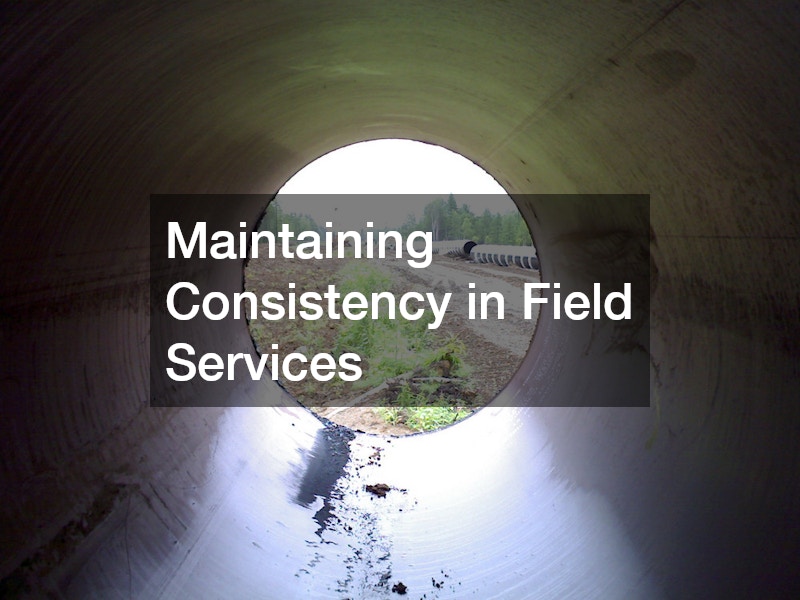In today’s competitive landscape, establishing a successful business, particularly in specialty fields, requires an intricate understanding of various operational dynamics. From optimizing online visibility to effectively managing inventory, each component plays a pivotal role in driving growth and ensuring sustainability. Implementing effective marketing strategies and clear operational processes will set the stage for long-term success in virtually any niche.
Running a specialty business demands more than just day-to-day management; it requires foresight and adaptability. Owners must balance customer expectations, employee performance, and industry-specific challenges while keeping an eye on growth opportunities. Learning from the successes and challenges of diverse service industries can provide valuable insights that apply across sectors.
Moreover, understanding how to integrate technology, streamline operations, and maintain high service standards can differentiate a business from its competitors. Focusing on efficiency, customer communication, and quality control helps build trust, retain clients, and foster a reputation for reliability. By taking a structured, proactive approach, business owners can navigate complexities more effectively and position their companies for sustainable growth.
In this article, we will explore various strategies that address the unique challenges faced across multiple specialty businesses and provide insights into how each can be overcome through systematic approaches.

Optimizing Online Visibility and Marketing Strategies
In the digital age, harnessing the potential of SEO is crucial for any business looking to enhance its online visibility. For many businesses, including those in the rv parts business, a robust online presence not only attracts customers but also establishes credibility within the market. Utilizing targeted keywords, creating quality content, and optimizing website structure lead to improved search engine rankings, thus driving organic traffic.
Effective marketing strategies go beyond SEO; businesses must engage their customers through diverse channels. Social media platforms, email marketing, and content marketing are excellent ways to build relationships with your audience. For businesses such as roofing contracting and septic tank cleaning, crafting compelling narratives about your services can foster trust and lead to more inquiries and conversions.
Regularly analyzing your marketing efforts is vital to ensuring continued success. Metrics such as website traffic, conversion rates, and customer engagement can provide valuable insights into the effectiveness of your strategies. By adapting and optimizing these efforts, businesses like local electrical contractors can stay ahead of their competition while increasing brand loyalty among their audience.
Managing Inventory and Customer Needs in Specialty Retail
Inventory management is a strategic aspect that can make or break specialty businesses, particularly the rv parts business. Finding the right balance between overstocking and understocking requires keen insight into customer demand and market trends. Efficient inventory systems help businesses maintain stock levels that cater to customer needs while reducing excess costs.
Understanding customer needs is not merely about stocking products; it’s about anticipating trends and preferences. Employing customer relationship management (CRM) tools can enhance how businesses interact with their clientele. By effectively analyzing data and feedback, companies in the rv parts business and other specialty sectors can customize their inventory offerings to better serve their customers’ preferences.
Continuous training and development for staff members engaged in customer service enhance the customer experience significantly. An informed employee can make recommendations that align with customer needs and can upsell effectively. For businesses, retaining a loyal customer base in a competitive market can hinge on the effectiveness of inventory management and responsiveness to market demands.
Ensuring Customer Trust Through Professional Service
Building customer trust is essential, especially in businesses like exterminators, where personal safety and well-being are at stake. Providing professional, reliable, and transparent services leads to lasting partnerships with clients. Employing trained professionals who adhere to industry standards and regulations delivers peace of mind to customers.
Communications are key to ensuring trust; regular updates about service processes and follow-ups after jobs demonstrate commitment to quality. Customer reviews and testimonials can solidify trust and showcase the effectiveness of services. An exterminator business can leverage satisfied customer stories to attract new clients and minimize skepticism.
Further, showcasing certifications, membership in professional organizations, and compliance with local laws reinforce a company’s commitment to providing safe services. By establishing a trustworthy brand identity through reliability and transparency, businesses not only retain clients but also encourage referrals, resulting in growth within their markets.

Maintaining Consistency in Field Services
In field services, particularly for septic tank cleaning businesses, consistency is vital. Customers expect reliable service delivery, so maintaining a steady work process can ensure that high standards are met continuously. By implementing standard operating procedures (SOPs), businesses can achieve uniformity in service, ensuring that every customer experiences the same quality level.
Training technicians and field staff regularly on these SOPs is paramount. Through continuous education, employees stay informed about the best practices in the industry and are equipped with problem-solving skills. For septic tank cleaning businesses, a well-trained team not only delivers consistent services but also builds customer confidence and loyalty.
Moreover, utilizing technology such as routing software and mobile apps can streamline operations. By optimizing schedules and routes, businesses can reduce travel time and improve efficiency. Investing in systems to maintain service consistency can significantly enhance client satisfaction and improve the overall operational effectiveness of any field service business.
Balancing Project Management and Client Expectations
The roofing contracting sector often wrestles with balancing effective project management and meeting client expectations. To navigate this challenge, thorough planning, effective communication, and client engagement are key. By establishing a clear project timeline and managing deadlines, businesses can set realistic expectations, reducing the likelihood of disappointment.
Regularly communicating with the client throughout the project is essential for maintaining transparency. Providing updates regarding progress helps reassure clients that their project is on track and can highlight any potential hurdles early on. A well-informed client is typically more satisfied and more likely to spread positive word-of-mouth about roofing contracting businesses.
Moreover, leveraging project management tools can prove beneficial in managing multiple client projects. These tools can enhance task allocation, workflow tracking, and deadline management, ensuring that all team members stay aligned with project goals. Employing such technology ultimately results in a smoother operation, contributing to enhanced customer satisfaction.
Providing Reliable Installation and Customer Education
In the home window replacement business, the quality of installation is critical for ensuring customer satisfaction. A verified installer equipped with the necessary skills and knowledge can significantly impact the final outcome. Thorough training and certifications can enhance the reputation of installers and instill trust in clients.
Additionally, educating customers about the installation process empowers them to make informed decisions. Offering guidance on selecting the right windows and understanding energy efficiency can transform a basic installation service into an expert consultancy. By asserting their expertise, businesses in the home window replacement sector can differentiate themselves from competitors, thereby increasing client loyalty.
Post-installation support is equally essential; businesses should provide clear instructions on maintenance and care for new windows. Providing warranties and responsive customer service further enhances the customer experience. By treating installation not as a one-time service but as part of an ongoing relationship, businesses can ensure continued customer satisfaction.

Scaling Operations While Maintaining Quality
As a grading business grows, the challenge of scaling operations while preserving the quality of service intensifies. Rapid growth can lead to compromises in service delivery if not managed carefully. Implementing robust quality control measures ensures that increased demand does not equate to decreased service levels.
Systematic hiring processes are essential as a business expands. Hiring skilled personnel who align with quality standards establishes a strong foundation for maintaining operational excellence. For a grading business, emphasizing training and adherence to best practices can help ensure that new employees uphold the company’s established reputation.
Leveraging technology can also enhance operational efficiency as businesses scale. Utilizing modern equipment and software solutions can streamline processes, reduce costs, and improve project turnaround times. By adopting innovative approaches while steadfastly prioritizing quality, rising businesses can meet increasing market demand without sacrificing the standard they are known for.
Handling Urgent Issues Professionally
In plumbing, immediate and efficient responses to urgent issues are critical. Customers often face unexpected problems that require prompt attention, and how a business handles these emergencies can significantly impact its reputation. Training staff to manage urgent situations calmly and effectively can enhance a plumbing business’s ability to retain customers and build trust.
Establishing clear communication channels with clients during emergencies fosters transparency and reassurance. Providing detailed information about the problem, options available, and anticipated costs helps mitigate customer stress. For plumbing businesses, professionalism in handling urgent matters builds long-lasting relationships with clients, who are more likely to recommend the service to others.
Furthermore, maintaining a reliable 24/7 service can set a plumbing business apart from competitors. Being readily available not only addresses client needs promptly but also showcases commitment to service excellence. By developing a robust system for handling urgent plumbing concerns, businesses can ensure customer satisfaction and continued loyalty.
Leveraging Production Efficiency and Supplier Management
Contract manufacturing relies heavily on production efficiency and effective supplier management to ensure timely delivery and competitive pricing. By developing strong partnerships with suppliers, businesses can negotiate better rates and improve their overall production capacity. Negotiating favorable terms with reliable suppliers ensures that quality materials are consistently available, scaling operations smoothly.
Implementing lean manufacturing principles can also enhance efficiency within contract manufacturing. Streamlining processes, reducing waste, and optimizing resource allocation can lead to significant cost savings and improved turnaround times. By harnessing such strategies, contract manufacturers can meet client demands without sacrificing quality.
Regularly assessing supplier performance and maintaining open lines of communication can further drive continuous improvement. By conducting audits and seeking feedback, businesses can identify areas for enhancement while fostering a collaborative environment. Quality control at every production stage ensures output remains consistent and meets customers’ expectations.
Building Local Reputation Through Skilled Service
Establishing a strong local reputation is crucial for any local electrical contractor. By consistently delivering high-quality service and demonstrating expertise, contractors can acquire referrals and build trust within the community. Engaging with local organizations and participating in neighborhood events can further increase visibility and word-of-mouth recommendations.
Customer engagement is vital to a contractor’s success. Providing clear communication, reliable service, and responsiveness to customer inquiries reinforces a contractor’s reputation. In specialty businesses, customers often rely on their networks for recommendations; thus, a local electrical contractor focused on providing exceptional service is more likely to secure lasting relationships.
Online reviews and client testimonials play an integral role in shaping a contractor’s reputation. Encouraging satisfied customers to share their experiences on platforms like Google and Yelp can significantly influence potential clients. Building a positive digital footprint requires not only skilled service but also proactive engagement with customers to enhance visibility.
Successfully navigating the complexities of specialty businesses requires a multifaceted approach. From optimizing SEO and managing inventory to building trust and maintaining consistency, each strategy contributes to operational success and customer satisfaction. Businesses like those in the RV parts business, extermination, plumbing, and roofing contracting must remain adaptable and focused on delivering exceptional quality and service to thrive in an increasingly competitive marketplace.
Ultimately, understanding client needs and leveraging technology can enhance productivity and efficiency across various sectors. As industries evolve, integrating these strategies will enable businesses to not only meet but exceed client expectations while maintaining the quality of service. By focusing on these foundational principles, specialty businesses can establish a brand recognized for its reliability, expertise, and dedication to customer satisfaction.
Equally important is fostering a culture of continuous improvement within the organization. Encouraging employees to provide feedback, pursue ongoing training, and embrace new tools or processes can drive innovation and operational excellence. Small, incremental improvements often compound over time, resulting in more efficient workflows and higher-quality outcomes.
Additionally, maintaining clear and consistent communication with clients reinforces trust and loyalty. Providing updates, setting realistic expectations, and being transparent about challenges can differentiate a business in crowded markets. Combining professional expertise with attentive customer service ensures that clients feel valued and confident in their decision to engage with your business.
Finally, monitoring performance metrics and analyzing industry trends helps businesses stay proactive rather than reactive. By tracking key indicators such as client satisfaction, turnaround times, and operational costs, owners can identify areas for improvement before issues escalate. This proactive approach allows specialty businesses to remain agile, competitive, and positioned for long-term growth.

